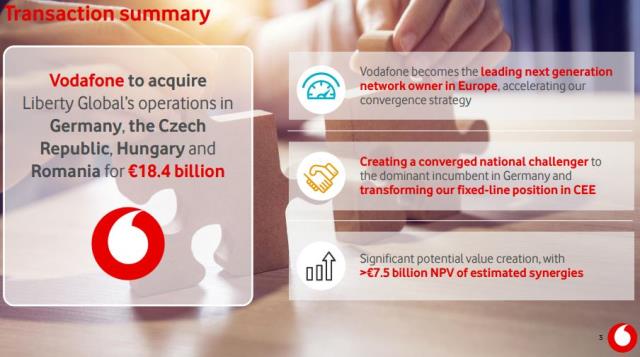Vodafone Group said it expects to secure EU antitrust approval for its $22 billion purchase of Liberty Global’s cable network business in Germany and eastern Europe by the middle of the year.

The world’s second-largest mobile operator expressed its confidence after receiving the European Commission’s statement of objections, which set out the watchdog’s concerns about the deal.
Reuters reported on March 20 that the EU competition enforcer would warn the company about possible anti-competitive effects from the proposed deal. The Commission had previously voiced worries about the impact in Germany, the Czech Republic, Hungary and Romania.
“The Commission’s statement of objections is an expected part of the review process. We will review the statement and continue our constructive dialogue with the Commission,” Vodafone said in a statement.
The European Union has not raised any major concerns about the impact on Germany’s cable market of Vodafone buying Liberty Global’s assets, Reuters reported.
Vodafone agreed in May 2018 to pay $22 billion for Liberty Global’s cable networks in Germany and eastern European markets to challenge the dominance of former monopolies such as Deutsche Telekom.
EU in December opened a full-scale probe into the deal, which has been strongly criticized by rivals Deutsche Telekom and Telefonica Deutschland.
Antitrust regulators said at the time they were concerned the deal would damage competition in Germany and the Czech Republic.
EU had accepted Vodafone’s Kabel Deutschland and Liberty’s Unitymedia cable networks, which serve different regions of Germany, were unlikely to ever overlap and so competition would not be reduced if they combined.
The Vodafone and Liberty cable assets used to belong to Deutsche Telekom and were broken up at the behest of the regulator when they were sold.
Competitors complain the proposed deal would recreate a dominant player in serving apartment buildings, where one gatekeeper typically controls access to multiple households.
Regulators, however, accepted there wasn’t direct competition between Vodafone and Liberty when they were offering TV services to housing associations.
There were also no major EU concerns about the impact in the Czech Republic of combining fixed line and mobile services.
EU said in December it would look into whether the combined group could have too much power in the Czech Republic through its ability to offer mobile, broadband and TV services.
That has been dropped from the statement of objections issued to the companies.
EU still has outstanding worries about a few areas of overlap, including Vodafone reselling broadband that uses Deutsche Telekom’s network in the areas covered by Liberty’s cable network.
The other issues concerned the increased influence the combined group would have on the broadcasters that supply programming, and the wholesale supply of TV to smaller operators.
Guy Peddy, head of telecoms research at Macquarie, said he continued to expect the deal would be completed in the middle of the year.
Vodafone said it was in constructive dialogue with the European Commission about the deal, which also includes operations in Hungary and Romania.
“This is a significant, pan-European transaction that will create a fully-converged national challenger in four European markets, and we remain confident that the Commission will recognize that it will deliver considerable benefits for consumers and competition,” the company said in a statement.





